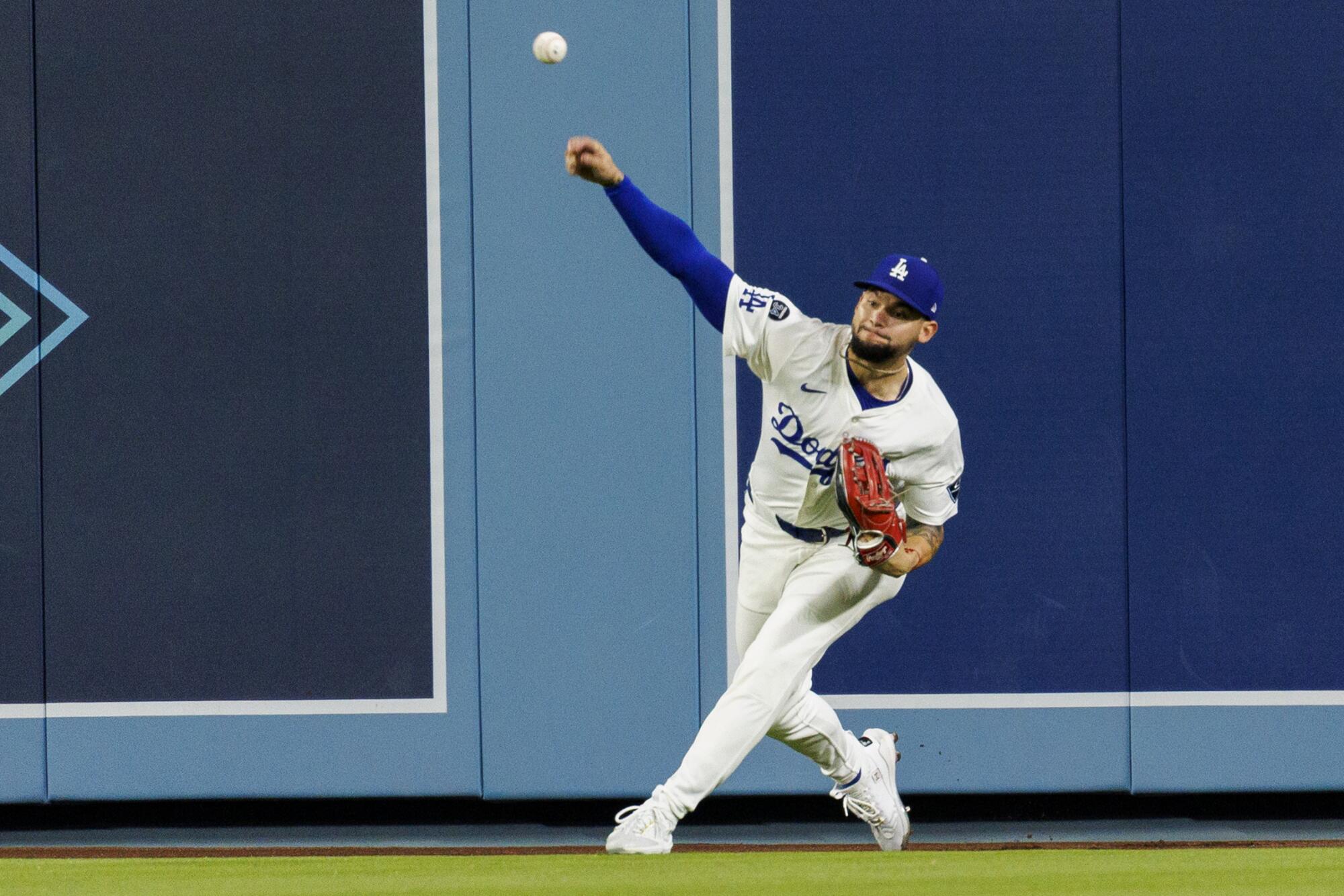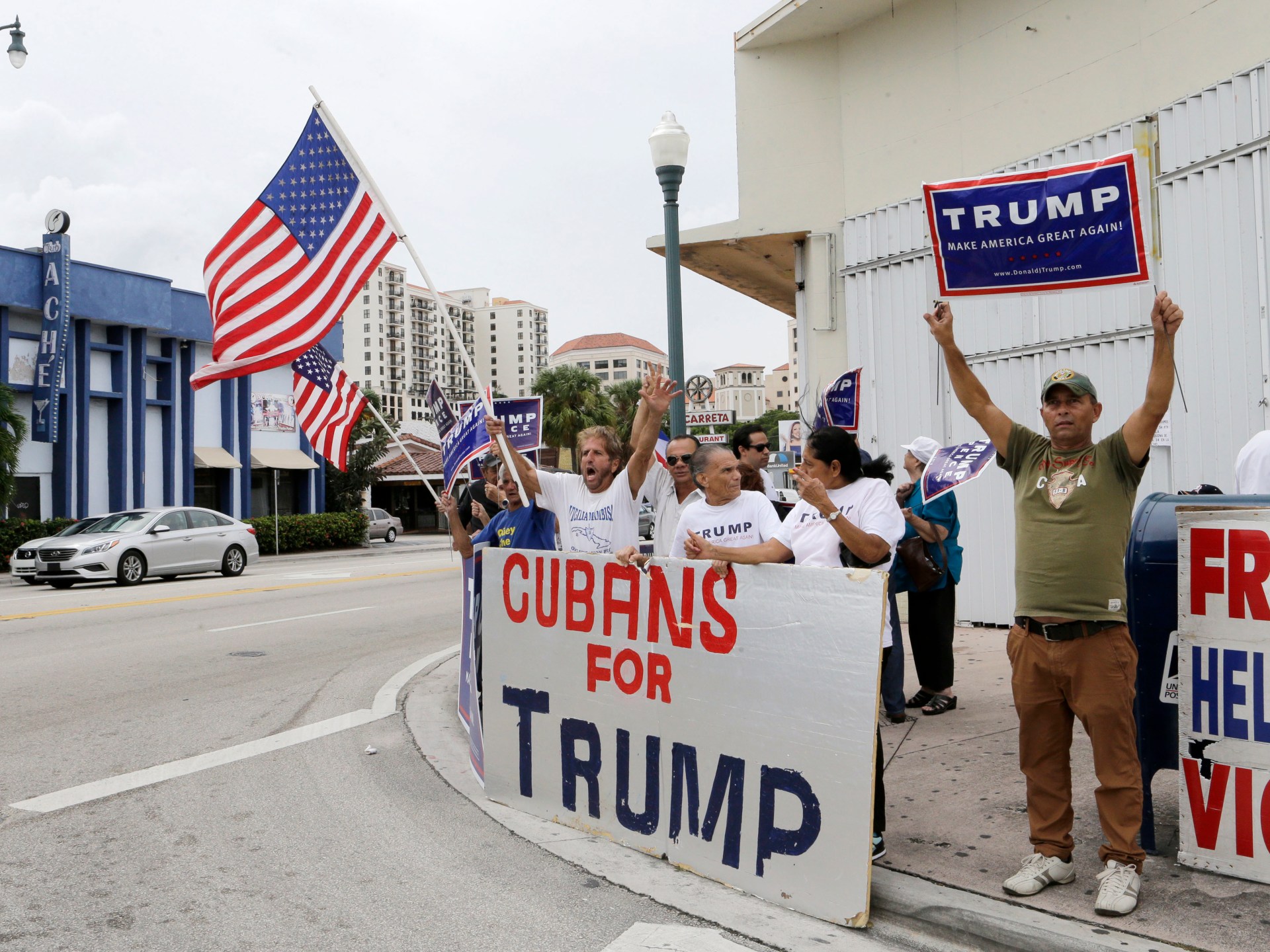Andy Pages is beating the odds again as Dodgers’ newest standout
ST. LOUIS — Growing up on the western tip of Cuba, Andy Pages excelled at every sport he played.
He was good at soccer and volleyball, arguably better at basketball. But he loved baseball for reasons that weren’t necessarily limited to the game.
Pages’ father, Liban, a carpenter who had a job repairing wooden boats, helped make his son’s first bats by hand, using leftover lumber given to him by friends. Soon baseball became the boy’s favorite pastime.
“When I was starting to play baseball in Cuba, when things were really bad, there were no bats. There weren’t things like that,” Pages said in Spanish. “So he always tried to make me a bat so I could play.
“I became more motivated, and from that point on, we’ve been playing baseball.”
The sport eventually proved to be a way off the island for Pages, who has emerged as one of the Dodgers’ brightest stars in just his second season with the team.
He entered the start of a three-game series Monday in San Diego hitting .288 with 12 home runs and 39 RBIs, trailing only Shohei Ohtani in homers and matching Ohtani for third on the team in RBIs. He’s also tied for second in stolen bases with six and has yet to be thrown out.
If he can stay consistent, he has a chance to become the first Dodger center fielder to hit better than .250 with 25 homers since Matt Kemp in 2011.
Although Pages never played in Cuba’s elite Serie Nacional, the proving ground for stars such as Yuli Gurriel, Yunel Escobar and Orlando “El Duque” Hernández, he became one of the country’s top prospects after hitting .364/.484/.581 in a under-15 league.
Dodgers outfielder Andy Pages rifles the ball to second base to prevent Arizona’s Ketel Marte from advancing on a single at Dodger Stadium on May 20.
(Gina Ferazzi/Los Angeles Times)
That convinced Pages (pronounced PAH-hays) he had a chance to be a big leaguer some day. So at 16, the Athletic reported, he arranged to be spirited off the island alongside Jairo Pomares, another young Cuban star, traveling through Guyana, Curacao and Haiti before crossing in the Dominican Republic. He then waited eight months before the Dodgers signed him as an international free agent in March 2018, giving him a $300,000 bonus, more than 1,500 times the average annual wage in Cuba, according to CiberCuba.
Pomares signed with the San Francisco Giants at about the same time, but while he remains in the minors, Pages’ climb to the majors was steady. He reached triple A by the start the 2024 season. He didn’t stay at Oklahoma City long, however, hitting .371/.452/.694 with 15 RBIs in 15 games to earn a call-up to the Dodgers.
Before his rookie season was over, Pages was a World Series champion. He paid a heavy price for that though, going seven years without seeing his family in person.
“It was emotional since I hadn’t seen them for a long time,” said Pages, 24, who returned to Cuba for the first time the winter before his big-league debut.
His sister, Elaine, a child when he left “was already a full-grown woman.”
“So those memories came back to me, and they were quite — how should I say it? — quite strong for me,” said Pages, who brought his father a few of the machine-made bats he used in the minor leagues.
But if his father provided the spark that made his son a baseball player, teammate Teoscar Hernández provided the help, guidance and mentoring that made Pages an everyday major leaguer.
“He’s played in the major leagues for a long time now,” Pages said of Hernández, a 10-year veteran who signed with the Dodgers months before Pages made his big-league debut. “He’s been through a lot of bad times. I went through that at the beginning of the season, for example, and last year too. And he’s given me advice that’s helped me a lot to get through that time.”
With Pages’ family still in Cuba, Hernández has become a big brother as well as a teammate, taking him out for dinner on off days or just getting together to play video games.
Andy Pages runs the bases after hitting a solo home run against the Athletics at Dodger Stadium on May 14.
(Gina Ferazzi/Los Angeles Times)
“Getting through bad times is sometimes a little difficult when you’re alone, when you don’t have anyone to help you, to give you good advice, and to make you understand that sometimes things don’t happen when you want them to,” Pages said.
And that’s worked out well for Pages. Three games after Hernández returned from a rehab assignment last month, Pages started a streak that would see him hit in 13 of his next 14 starts, including 11 in a row, raising his average 24 points to .293. He’s batting .379 with a team-high 11 hits in seven games this month.
“We try to go out to my house. We go out to a restaurant with my wife, his wife. Just so we can get together, have time to enjoy and not think about baseball,” Hernández said.
Pages isn’t the first player to benefit from Hernández’s mentorship. During his six seasons in Toronto, Hernández took another talented rookie, fellow Dominican Vladimir Guerrero Jr., under his wing. Guerrero is now a four-time All-Star.
Hernández is still so respected in Toronto when the Dodgers played there last season, some Blue Jays players wore his old uniform number during batting practice. Earlier this year Guerrero offered to buy him a $300,000 Richard Mille watch; Hernández joked he’d rather have money instead.
As the quiet Pages has grown more confident and comfortable with the Dodgers, his play has improved. A speedy outfielder with a plus arm, he also can play all three positions.
And while he left Cuba, he never fully left it behind, having expressed interest in representing the country in next year’s World Baseball Classic. The decision to go to the Dominican Republic as a teenager, after all, was a business one, not a personal one.
Pages would also like to bring his family to U.S. some day, though that dream was dealt a setback last week when President Trump signed an executive order restricting access to Cubans hoping to come to the U.S.
“Hope is always there,” said Pages, who has beaten impossibly long odds once. “But you have to follow the rules, get the papers, do whatever it takes to make sure everything’s OK. And then get here and stay here.
“I’m just trying, trying until they can leave.”


